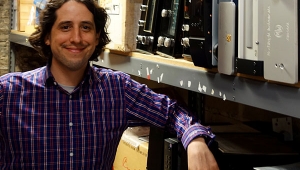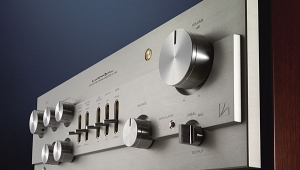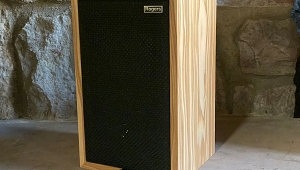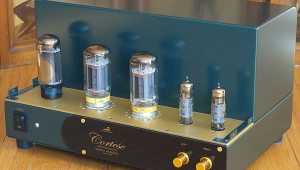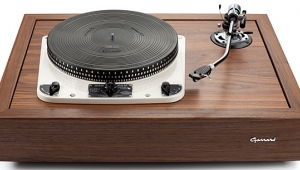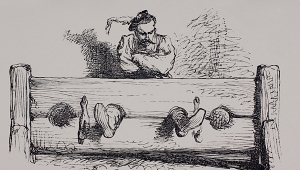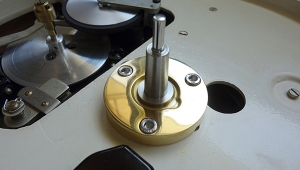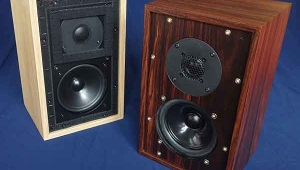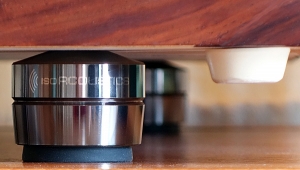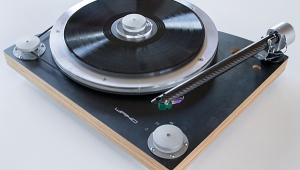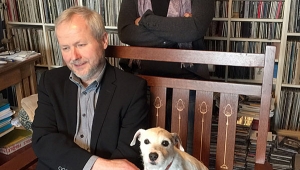| Columns Retired Columns & Blogs |
Listening #34
What is best in music is not to be found in the notes.—Gustav Mahler
Some things have changed for the better. People say it's easier to get a decent meal in Moscow than it used to be, and, almost regardless of one's views on organized religion, it's good that Russians can now worship as they please, and that they've responded to their newfound freedom with a hopeful fervor.
Then again, now that Russia is catching up with the rest of the world on so many fronts, it may be only a matter of time before their venerated classical music tradition is dragged through the alleys of commerce and spoiled: shot through with the same greed and soul-rotting thirst for titillation that so many others have suffered.
For the time being, Russian music remains unadulterated, and that's what lured the Grammy Award–winning engineer Kavi Alexander to Saint Petersburg, a city that was off-limits to American record companies for most of the 20th century. In 2003, after literally decades of trying, Alexander was granted access to the legendary Great Hall of Saint Petersburg, home to both the Saint Petersburg Philharmonic and the Saint Petersburg Academic Symphony. The immediate results of his efforts are three new Water Lily Acoustics releases: the Shostakovich Symphony 7 ("Leningrad"), conducted by Alexander Dmitriev; Evgeny Svetlanov's Piano Concerto in C Minor, also conducted by Dmitriev, with pianist Vladimir Ovchinnikov; and Mahler's Symphony 5, conducted by the great Yuri Temirkanov (who is also the current music director of the Baltimore Symphony Orchestra). All three were captured during live performances in the Great Hall, and all are available as regular CDs and as dual-layer SACDs.
 Barriers
Barriers
Kavi Alexander began the project by traveling to Russia in July 2003, hoping to negotiate a contract between Water Lily and the management of the Great Hall. "I do not speak a word of Russian," he says, "so when I first went over, I had a beautiful Russian woman with me, who is a friend of a Russian woman I know in Santa Barbara. While I was there, I also found a cafe that I liked, and met a fellow who worked there who spoke English well. I offered him a job, to help me during my stay, and he was happy to do that. Of course, Maestro Temirkanov speaks English—very well. I dealt with him, his assistant, the principal cellist, and the managing director, all of whom speak perfect English. So I really had no trouble."
Not only was the language barrier not a problem, but Alexander found the Russian musicians were dedicated to their art and willing to cooperate with his recording project. "There was none of this paranoia, none of this 'I'm a star' business," he says. "I ate in the canteen alongside the musicians every day, and the people there didn't talk about material things. No one talked about their new SUV, or how much money they were making. The atmosphere was very artistic."
The atmosphere was also a boon to the other purpose of Kavi Alexander's first trip to Russia: making a series of test recordings with his field setup, comprising a Tascam DA-98HR—which can record up to two hours of multitrack PCM or two-channel DSD on a Sony AIT cartridge—and Pearl extended-range microphones. The Pearls use long, rectangular capsules, which Alexander describes as having line-source–like properties: "I don't know the physics," he says, "but [the capsule shape] seems to give an enhanced sense of imaging." He used two microphones in a Blumlein configuration suspended 15' above the floor and 15' from the first row of players.
"The Saint Petersburg Philharmonic has their own sound engineer," Alexander says, "and during my second visit he asked me, 'How did you arrive at this microphone position?' So I told him that I had been to the hall before and made some test recordings—and he said that I had arrived at the very same positions that the Soviet acousticians had found to be best!"
Encouraged by the success of those test recordings, Alexander returned to Russia in September 2003 to make the recordings that would comprise the first wave of Water Lily's Saint Petersburg releases. This time he enlisted the aid of a very friendly cab driver—"He was astounded when I offered to pay him to be my driver for an entire day"—which gave Alexander even greater freedom to breathe in all the art that Saint Petersburg has to offer. "Every morning I would start by going to a different Orthodox church—each one a museum, a place of great spiritual and artistic value. I went to light candles and smell the frankincense and listen to the beautiful music. I also went to the conservatory at Saint Petersburg, and it, too, is a holy place: The people there truly worship music."
And every day, there were concerts at the Great Hall. "The audiences in Saint Petersburg are incredibly passionate and well-versed," Alexander says. "To them, a concert is not a social event, a place to show off your mink coat." He illustrates this with a story about recording the Shostakovich Seventh, whose program refers to the Nazi siege of Leningrad during World War II: "On the day of the recording, the stage hand, whose name was Victor, came up to me and said, 'You're going to record the Shostakovich tonight, right?' I said yes, and immediately Victor began telling me his own story about the siege of the city. He told me about the horrors he witnessed, and how his grandparents went hungry so that their grandchildren would have enough to eat—all of this with tears streaming down his face.
"So, that evening, there is Victor at the concert, front-row seat, looking grand in a double-breasted suit with a carnation in his lapel. I was so moved to see him. And I looked at the front of the stage, and there is a portrait of Shostakovich, surrounded with flowers. And then I see him at the front: Maxim Shostakovich, the composer's son . . . "
 Alexander couldn't linger with the audience, but had to retire to the recording booth—not that that was any great hardship. "I was in a separate room, where I had complete silence, listening through headphones. I was surrounded by Czarist artifacts: I know nothing about furniture, but these were obviously valuable and very-well-preserved antiques. This was by no means a mere monitoring room, but a place made more for the reception of royals."
Alexander couldn't linger with the audience, but had to retire to the recording booth—not that that was any great hardship. "I was in a separate room, where I had complete silence, listening through headphones. I was surrounded by Czarist artifacts: I know nothing about furniture, but these were obviously valuable and very-well-preserved antiques. This was by no means a mere monitoring room, but a place made more for the reception of royals."
The surroundings were in keeping with the way Alexander was treated during his work at the Great Hall. "Were the people friendly? I was treated with kid gloves, like a visiting dignitary. At one point a woman threw a flower at me! What an amazing world!"
Temirkanov & Mahler
The Shostakovich performance was surely an important event in Saint Petersburg's recent musical history, and the Water Lily recording of it is satisfying in every way. Still, it's the Mahler 5, under the direction of Temirkanov, that has spent the most time in my CD player. "The Saint Petersburg Philharmonic has only recorded Mahler once before," according to Kavi Alexander. "The Second, under Tennstedt, for an Italian label. And it is unfindable. Nonexistent. So, for all intents and purposes, this is the first Mahler disc from Saint Petersburg." Alexander looks forward to reaching committed Mahlerians with his new release. "People who buy the Mahler will buy it for the music; they won't care if it's three microphones or 30. And that's good.
"I think that Yuri Temirkanov is one of the very best living conductors, on a par with the greats. Because he doesn't have the fancy haircut or the three-day Hollywood growth, he gets overlooked. And he will not do interviews: 'You want to know about me? Listen to my music.' But he is the last of his breed. When he is gone, that is it."
- Log in or register to post comments
